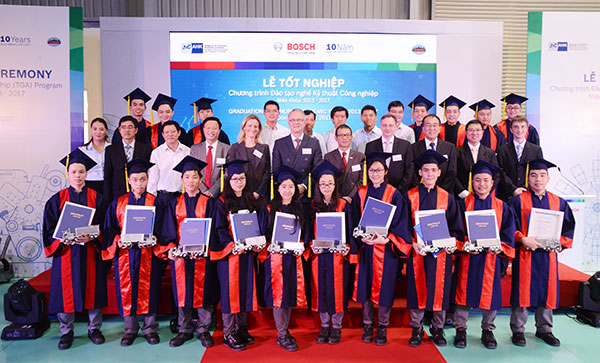First generation of Bosch apprentices graduates
 |
“The graduation of Bosch TGA’s first apprentices marks an important milestone in the company’s commitment to help develop a highly-skilled technical workforce in Vietnam. We believe that by successfully completing the programme, which is based on German vocational training standards, our apprentices are capable of taking up specialist and managerial positions at Bosch manufacturing plants in the future,” said Vo Quang-Hue, managing director of Bosch in Vietnam, at the graduation ceremony in the southern province of Dong Nai on April 20. “The success of Bosch TGA demonstrates that a high-quality vocational training programme would help improve employability for apprentices. Therefore, we hope that the dual-vocational training model can be multiplied.”
Bosch TGA was established in Vietnam in 2013 with only one discipline at that time, industrial mechanics. In 2016, the programme started offering mechatronics as a second discipline to its vocational training curricula. The number of apprentices recruited annually is 24, at 12 per discipline.
As of April 2017, the Bosch TGA has 93 apprentices, of which female apprentices account for 23 per cent. Since 2013, Bosch has made a total investment of more than $1 million into this dual-vocational training programme.
Bosch TGA is one of the first partnerships under the dual-vocation training framework of the Delegation of German Industry and Commerce in Vietnam (GIC/AHK Vietnam). The programme does not charge the apprentices any tuition fee, and offers a monthly allowance throughout the duration of the apprenticeship with Bosch.
Upon the successful admission into the programme, apprentices undergo 3.5 years of theoretical studies at the LILAMA2 Technical and Technology College, and practical training with modern machinery and equipment at Bosch TGA. In the last one and a half years of the program, apprentices spent most of their time working at the Bosch Gasoline Systems plant in Dong Nai.
The programme is designed to not only equip apprentices with technical skills, but also prepare them for long-term career development by building up their social skills. All apprentices at Bosch TGA are entitled to English and intercultural training throughout their apprenticeship.
Among the 17 apprentices who graduated in 2017, four had undergone exchange programmes abroad in 2015. As of April 2017, Bosch TGA has sent eight apprentices to other Bosch manufacturing plants in Germany and China. The exchange programmes offer apprentices opportunities to experience different cultures, learn to work in other countries, foster their ability to act independently, take responsibility for their actions, and develop strong teamwork skills.
In 2016, Bosch TGA received almost 930 applications, which was a positive increase as compared to 150 when the programme first started recruitment. The year-on-year increment of applications is an indicator of quality for Bosch TGA.
“More importantly, there is a shift in the public mentality towards vocational training, and this is really encouraging,” Hue said.
Bosch has been committed to occupational training for more than 100 years around the world. On April 1, 1913, Robert Bosch founded his company’s first occupational training department in Stuttgart, Germany. Since then, more than 100,000 young men and women have begun their professional lives with the dual occupational training programs at Bosch in 20 countries across the globe.
What the stars mean:
★ Poor ★ ★ Promising ★★★ Good ★★★★ Very good ★★★★★ Exceptional
Latest News
More News
- State corporations poised to drive 2026 growth (February 03, 2026 | 13:58)
- Why high-tech talent will define Vietnam’s growth (February 02, 2026 | 10:47)
- FMCG resilience amid varying storms (February 02, 2026 | 10:00)
- Customs reforms strengthen business confidence, support trade growth (February 01, 2026 | 08:20)
- Vietnam and US to launch sixth trade negotiation round (January 30, 2026 | 15:19)
- Digital publishing emerges as key growth driver in Vietnam (January 30, 2026 | 10:59)
- EVN signs key contract for Tri An hydropower expansion (January 30, 2026 | 10:57)
- Vietnam to lead trade growth in ASEAN (January 29, 2026 | 15:08)
- Carlsberg Vietnam delivers Lunar New Year support in central region (January 28, 2026 | 17:19)
- TikTok penalised $35,000 in Vietnam for consumer protection violations (January 28, 2026 | 17:15)
















 Mobile Version
Mobile Version